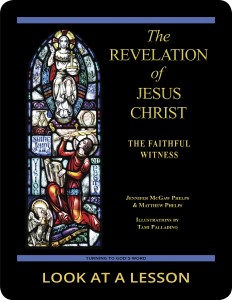witness & testimony
 As we reflect on the cost and conflict that comes with proclaiming the word of God, the Letter to the Hebrews 12:1 (NABRE) reminds us that we are surrounded by a great cloud of witnesses. Within the context of Christianity, bearing witness came to have a special sense, and the Greek word for “witness” came to be associated with giving one’s life for the Gospel.
As we reflect on the cost and conflict that comes with proclaiming the word of God, the Letter to the Hebrews 12:1 (NABRE) reminds us that we are surrounded by a great cloud of witnesses. Within the context of Christianity, bearing witness came to have a special sense, and the Greek word for “witness” came to be associated with giving one’s life for the Gospel.
The Greek word that means “witness,” μαρτυρία (marturia), also is the root of the English word “martyr,” though it originally had nothing directly to do with death or dying. Rather, in its root form, marturia is a legal word, and the testimony or witness to which it applies is testimony in the legal sense of the word.
Jesus came to bear witness to the saving love and power of God for his people, and that witness took the form of his death and Resurrection. This powerful witness of Jesus Christ is the foundation of our Church, but it also is the mission and call of the Church. We’re all called to continue to bear the same witness—even to the point of death.
related topics: conscience; religious law
you also may like our study of the book of Revelation
 The Revelation of Jesus Christ: The Faithful Witness, a 23-lesson Catholic Bible study with an imprimatur, examines ways in which our traditional Christian view of heaven is built on Hebrew apocalyptic visions recorded in the Old Testament. This recently revised study includes maps and additional commentary and takes a close look at the role of the prophets in present-day Christianity. Illustrations by Tami Palladino depict the often-misunderstood images in the book of Revelation. Click on the book’s cover to view a sample lesson.
The Revelation of Jesus Christ: The Faithful Witness, a 23-lesson Catholic Bible study with an imprimatur, examines ways in which our traditional Christian view of heaven is built on Hebrew apocalyptic visions recorded in the Old Testament. This recently revised study includes maps and additional commentary and takes a close look at the role of the prophets in present-day Christianity. Illustrations by Tami Palladino depict the often-misunderstood images in the book of Revelation. Click on the book’s cover to view a sample lesson.
 Click on the picture of the statue of Moses with horns (above) to learn more about Lost in Translation. A new entry is archived each Monday. Contact us to receive Lost in Translation by email every week. You may use any of the contact links on our website to ask Matthew a question.
Click on the picture of the statue of Moses with horns (above) to learn more about Lost in Translation. A new entry is archived each Monday. Contact us to receive Lost in Translation by email every week. You may use any of the contact links on our website to ask Matthew a question.
